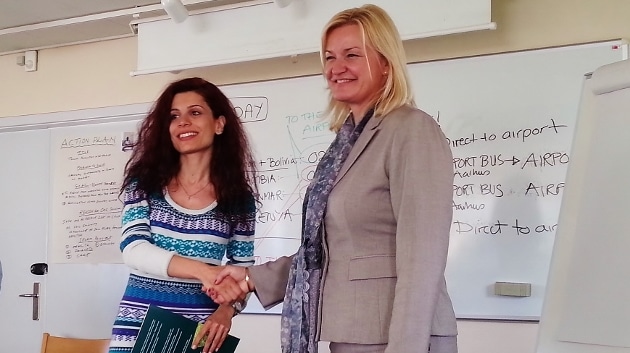A nourishing connection
11-09-13

Feedback from a participant from Libanon.
In April, Carine Lteif, an agriculture and urban planner from Libanon, participated in the Danida Fellowship Centre (DFC) course “Organic Agriculture and Products – in a Local and Global Perspective.”
As a representative of the Environment and Sustainable Development Unit (ESDU) of the American University of Beirut (AUB), she had received an invitation to attend the course.
After the course she published an article about her impressions in the newsletter of the Danish embassies in Damascus and Beirut.
Here we bring some of the highlights.
The happiest country
Carine had come across an article describing Denmark as ‘the happiest country in the world’ and would consider the statement wrong had she not visited the country and witnessed the high living standards.
She says: “Actually, several factors contribute to ensuring a high quality of life in Denmark but, to my mind, it is especially the government’s support to the agricultural sector and the increasing interest in organic production and consumption that ensures this.”
“At an environmental level, large cropped areas, forests and organic production, in particular, allow air recycling and reduce environmental nuisances. However, and most importantly, Danish farmers and all the other stakeholders abide by strict regulations to provide people with healthy food which is not always available in other parts of the world.”
She is also puzzled overthe fact that Denmark is able to produce food for 15 million people. Three times the entire population of Denmark.
Successful lobbying
Carine Lteif and the other participants attended lectures on the principles of organic agriculture, the production and marketing of organic products, and the importance of innovation and action planning.
Besides meeting with Danish specialists they were accompanied on field visits to cattle, pig and goat farms, processing units, feedstuff units, and vegetables fields.
“We visited local market suppliers of organic food and an organic NGO whose concept, structure, and lobbying forces are noteworthy, as it appeared that they have successfully assisted in putting organic agriculture on the national agenda,” Carina Lteif notes.
Benefit to a larger international community
For Carine Lteif attending the course on organic agriculture was important for Environment and Sustainable Development Unit, which also works at a regional level.
“I was the only representative of the MENA4 area. Therefore, information and updates on organic agriculture are to be circulated, through different projects, to benefit a larger international community. Moreover, the team is actually developing several projects that fall under a Food Security Program.
The Environment and Sustainable Development Unit is working on establishing food markets where small marginalized Lebanese producers and processors will exhibit traditional and organic products.
“It constitutes a first step towards the creation of the Food Heritage Foundation (FHF), an autonomous body that promotes the production and processing of traditional and healthy organic food, sustaining local livelihoods.”
“At the same time, the unit is looking to build strong partnerships with potent Danish partners, and this trip constituted an opportunity to meet with some of them and discuss future cooperation,” Carine Lteif concludes.
She hopes that her participation has paved the way for others. “In the future I hope to see a higher number of Lebanese participants in courses, and certainly, successful partnerships!!”
Read the whole article by Carine Lteif here
Go back to our stories
